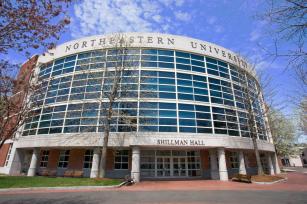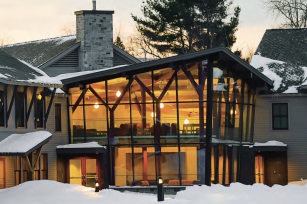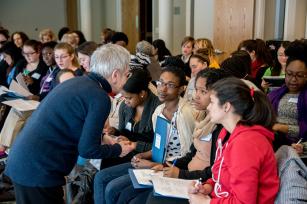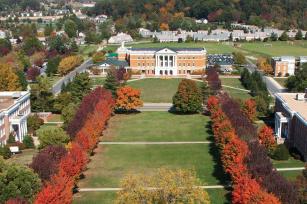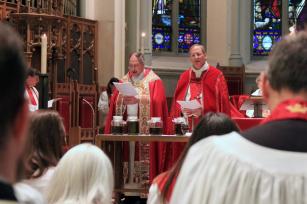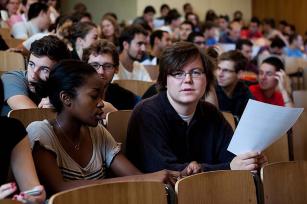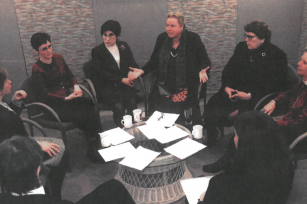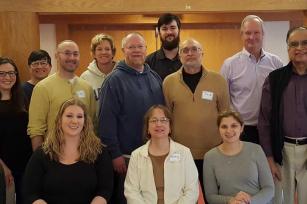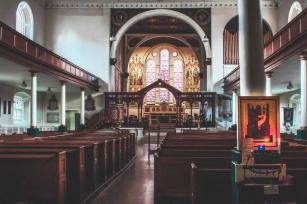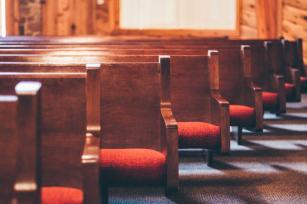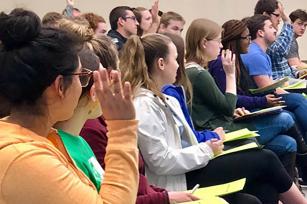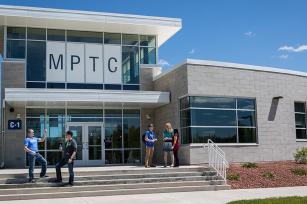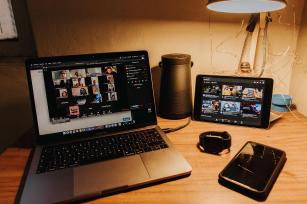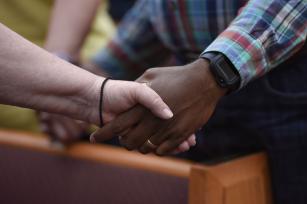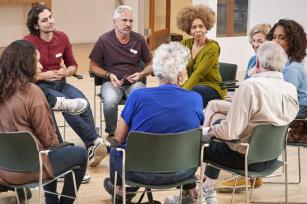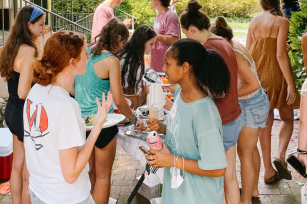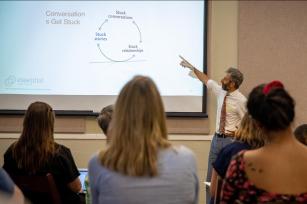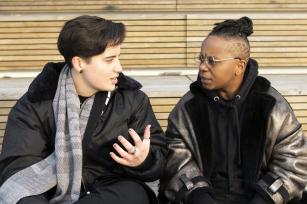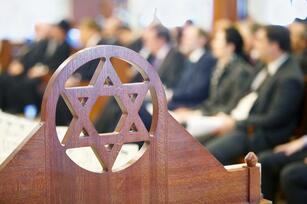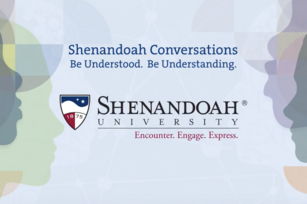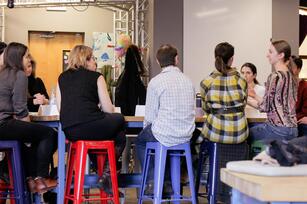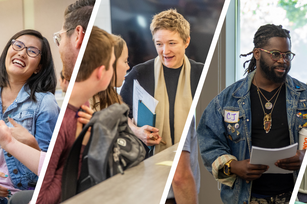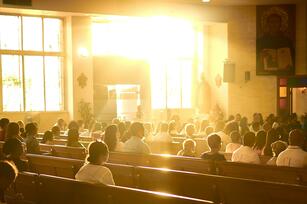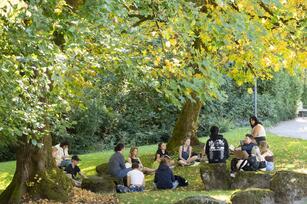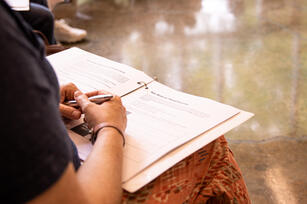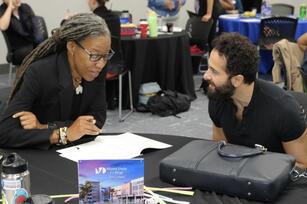
Breadcrumb
- Essential Partners
- Our Impact
- Impact Stories
- From Suspicion to Curiosity: Pastors, Faith, and Science
From Suspicion to Curiosity: Pastors, Faith, and Science
Consider the varve. It’s basically a rock with layers, every layer representing the sediment of a year. A six-inch wedge of stone with roughly 2700 layers—a humble specimen of history and geology, but it brought together two historically estranged worldviews for conversation, learning, and growth.
Evangelical Christianity remains a powerful religious, cultural, and political movement across the country. The conversation about science and its discoveries, particularly within conservative faith communities, has been fraught. The estrangement between religious and scientific communities has become deeply polarized.
Conservative pastors are placed in difficult positions with incredibly high stakes as spiritual leaders when science is the topic at hand: perhaps some congregants are curious about evolution, but even acknowledging the question puts the congregation’s leader at risk for others questioning his or her interpretation of scripture, and even his or her faith.
How can they speak constructively to a high school student who will go to college and learn what science says about the age of the earth, but also discuss these issues with the student’s very conservative grandparents?
Church leaders face the risk of alienating their congregation, losing their pastoral legitimacy, and risking their identity and community; there are few opportunities for curiosity, for scientific study, or safe conversation.
Pastors + Scientists = Understanding
Enter the BioLogos Foundation, which invites the church and the world to see the harmony between science and biblical faith. BioLogos partnered with Gordon College, led by biology professor Craig M. Story—himself a Christian—to offer the first “Pastors, Faith, and Science” course in the summer of 2014.
The one-week, intensive course sought to create a space for 20 pastors from across the country to learn from scientists, have permission to ask questions without jeopardizing their deepest convictions or putting them at risk of alienation from their spiritual communities.
Essential Partners was brought in to plan and facilitate the retreat at Gordon College to pay special attention to creating an atmosphere that promotes learning, inquiry, and open conversation with world-class scientists from the National Institute of Health, Massachusetts Institute of Technology, and other institutions of higher learning.
EP practitioners John Sarrouf and Bob Stains approached the group with a clear understanding that the goal was not to convince pastors about particular scientific truths, but to provide insights into the scientific process and its findings.
In a depoliticized setting, scientists and clergy were able to talk to each other and explore new ways to understand one another more deeply. Pastors could become students, ask questions, and explore new ideas without the responsibility to a public position.
One of the first activities was examining the varve. The implications of that rock are significant for people who want to reconcile scripture with scientific findings. Another activity involved discussion of the mapping of the human genome, and explored how speciation might be understood in the context of the Genesis story.
Pastors paired up and talked about what excited them, what unsettled them, and which questions the new discoveries brought up for them as individual believers and as community leaders.
A Space of Trust and Discovery
Pastors found a space to discover the world in a new way, within a community of fellow learners and believers. In particular, they noted a growing confidence to support the spiritual and intellectual development of younger parishioners who are navigating questions about modern science.
No longer did scientific inquiry seem untouchable; rather, there was a very deep commitment on behalf of the pastors to continue learning, bridging these perceived differences, and approaching both science and with scripture with openness and curiosity.
If a growing portion of the United States population distrust science because it sees that enterprise as fundamentally in opposition to their identities, any benefits from such discoveries is jeopardized. Similarly, scientific discovery will fall on deaf ears if scientists don’t have the skills to communicate in ways that make space for people’s beliefs.
Said one participant, “I think one of the biggest mistakes we make in the world today, coming out of the enlightenment, is we have this idea that if we study enough, if we learn enough, we will answer all the questions…but it’s not the whole story.”
Gatherings like this illuminate the value of engaging across differences. Polarization deepens when we cling to positions without listening to or honoring other people, their multitude of experiences, and their nuanced set of beliefs.
Related Impact Stories
Testimonials

Imam Sani IsahThrough this training, we will have more people in the stream of work that we do and become better equipped with the know-how, skills and techniques. But most important, together we will sow a seed that will germinate and become a source of the antidote to terrorism, fanaticism, bigotry and extremism.
Nigeria

Program ParticipantThis is a different tool for engagement. It’s not about you, it’s about others. It involves the art of listening and sincerely talking from the heart
Interfaith Mediation Centre, Nigeria

Cricket Fuller, The Christian Science MonitorThis wasn’t a policy debate [about guns]. Instead, two people whose backgrounds and views diverged in almost every way possible shared a moment of honesty that struck at the heart of the matter.
Boston, Massachusetts

Alex Lyford, Assistant Professor of StatisticsI can't possibly overstate the positive effects the Dialogic Classroom training had on the curriculum and approach to my Introduction to Data Science class. The difference in the course from a year ago and now is night and day. My lectures are now filled with meaningful discussion and discourse—often related to sensitive topics that I wouldn't have dared touching without the training. Student feedback about these discussions has been overwhelmingly positive, and there is no chance that I would have had the wherewithal or initiative to revamp the course in such a dramatic manner without the training.
Middlebury College

Program ParticipantI felt an amazing sense of accomplishment when the Essential Partners training ended; that I'd done something important for my community and something important for me.
Massachusetts

Program ParticipantI did not anticipate having as many concrete takeaways as I do. I feel there is an immense practical application.

Noga Shemer, Associate Professor in Anthropology“When I started bringing the RSD model into the classroom, it changed everything, and I had this overwhelming sense of what the classroom could be. The student feedback was unlike anything I had seen before. Students said, ‘Wow, why haven’t we had the chance to do this before? And why don’t we get to do this more often in our education?’”
University of Connecticut

Undergraduate StudentIt’s nice to talk about things that we encounter all the time but rarely get talked about. This made me hopeful that there are people who are willing to talk about serious issues.
Dartmouth College, New Hampshire
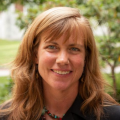
Dr. Jill DeTemple, Religious Studies FacultyAfter using this approach in my classroom, I am now more willing, and more able, to engage students in meaningful conversations about potentially contentious issues. Whereas I used to nod toward things like homosexuality in religious life, interfaith marriage, or the role of government in reproduction, now I build these conversations into the class so students can learn to speak about their experiences, and so they learn to listen and learn from those with whom they might disagree.
Southern Methodist University, Texas

Program ParticipantWhile our differences remain, the relationships between us have been strengthened and deepened. We have gained in mutual respect, affection, and appreciation of one another as followers of Jesus and fellow-bishops.
Anglican Community & Human Sexuality Retreat

Program ParticipantI am now open to new views and can moderate my impulse to debate or persuade others of different views
Montana

Kim Davidson, OmbudsI’ve gained not only confidence but tools. The Essential Partners training was worth every penny.
Oberlin College, Ohio

Undergraduate StudentI have learned how to not be offended and to be better prepared to receive other people's communication. You don't have to agree, but you can respect the other person.
Randolph College (VA)

Anjali Bal, Associate Professor of MarketingWe talked about where we are in the world right now, so we talked quite a bit about polarization. Essential Partners showed how these conversations are becoming more taxing and challenging because of that polarization. These were some first steps in terms of how we can start to have those conversations.
Babson College, MA

Nicki Glasser, Policy CoordinatorWhat surprised me was how much you could transform a relationship during a three-hour conversation.
Transformation Center, Massachusetts

Megan DeFranzaThere is a need not only for safe space within our churches but for our church leaders who often feel alone, or who may feel their job could be at risk if they engage in controversial conversations. How are they to make safe spaces in their own congregations for healthy dialogue if they rarely experience safe space to do the same?
Gordon College, Massachusetts

Program ParticipantThe highlight for me was the interconnectedness of the participants’ views, mutual respect, and range of experiences within the group
Montana

Noga Shemer, Associate Professor in Anthropology“Students come to university so they can think deeply about issues that matter. They are the future, and the stakes are high. They want spaces where they can think these things through.”
University of Connecticut

Program ParticipantThis is the best adult learning experience I have had in the past five years. I wanted to learn new skills—I did!

Program ParticipantThere should be opportunities throughout the [Anglican] Communion for ongoing structured conversations regarding difficult issues. These should engage persons at all levels within and between Provinces and should be guided by agreed covenants similar to those that have assisted our conversations.
Anglican Community & Human Sexuality Retreat

Undergraduate StudentAt the beginning of the semester, there was not much participation in class. But by the end, almost everyone had something constructive to add every day.
Bridgewater College, Virginia

Undergraduate StudentI notice that my classmates take much more care when speaking about people who practice other religions. They make fewer assumptions, and they’re more careful with their words to make sure to avoid unintentional connotations.
Bridgewater College, Virginia

Undergraduate StudentThe professor was able to engage every student. She encouraged them to present new ideas. Dialogue helped create an environment that really deepened the understanding of the material.
Southern Methodist University, Texas

Synagogue Congregant“After Octover 7th, I used the Essential Partners Guide to Dialogues About Israel and Palestine to design the dialogue and develop prompts. I deployed the training I received from Essential Partners to lead a Reflective Structured Dialogue where participants could share stories, encourage curiosity, and approach one another with tenderness. … The dialogue programs at our synagogue were a resounding success. Members still hold very different perspectives, but those who disagree, even vehemently, have been able to maintain relationships. Those whose views fall between the extremes feel more able to share their perspectives. They see one another as members of a shared community once again.”

Undergraduate StudentI learned to expect the best of my classmates, even when we don’t agree. I can’t write off their opinions anymore, despite our disagreements.
Bridgewater College, Virginia

Anne Hopkins Gross, Dean of StudentsThe Essential Partners workshop was a way of building up our ability to talk about more difficult issues, such as poverty and GLBTQ safe spaces. It was really the foundational entrée into those more challenging issues of race, ethnicity, sexuality, and gender. People walked away feeling much more confident about having difficult conversations.
Southern Vermont College, VT

Anjali Bal, Associate Professor of MarketingOne of the things that we talked about was the ability to hear another person’s point of view, even if our minds aren’t changed. We have to remember that any sort of movement is movement. If we don’t acknowledge small movement, then we just stay on two different sides, and it’s all black and white, and we don’t hear each other.
Babson College, MA

Janet Bixby, Director of Community Dialogues“Essential Partners has the magic sauce—its trainings. Working with Essential Partners and Community Dialogues has enabled us to say, ‘Hey, we have tools to help us be able to do this, and we have ways to do this. We can address these things.’ That's been incredibly useful and powerful.”
Lewis & Clark

Undergraduate StudentDialogue challenged us to think more deeply about the class topics. Talking about our own thoughts and experiences in relation to the topic also challenged us to think about our own views and articulate them more clearly.
Gordon College, Massachusetts

Undergraduate StudentI feel more comfortable participating in class and less defensive when other students disagree. And because I learned more from my fellow students about their views, I now feel less competitive with them than in other classes.
Bridgewater College, Virginia

Janele Nelson, Mission DirectorIn these divisive times, Essential Partners has given my local YMCA and now the national YMCA a means to build bridges through dialogue, re-establishing foundations for constructive change to occur.
YMCA of Pierce & Kitsap Counties (WA)

Cricket Fuller, The Christian Science MonitorThis wasn’t a policy debate [about guns]. Instead, two people whose backgrounds and views diverged in almost every way possible shared a moment of honesty that struck at the heart of the matter.
Boston, Massachusetts

Dr. Brooke Vuckovic, Clinical Professor of Leadership“The Dialogic Classroom is by far and away the most skillful and thoughtful professional development I have had in years as an educator.”
Kellogg School of Management

Ben Meoz, VP for Student Life and Dean of Students“We want to cultivate genuine curiosity among students so that they really open themselves to the needs of others and also feel like others have an awareness of what their needs and experiences are.”
Lewis & Clark

Member of the CongregationI cannot possibly walk out of this experience and help being a different person. I feel that my own experience has been life-changing.
Glendale Presbyterian, California

Undergraduate StudentWe tackled really difficult topics and this helped everyone know each other and understand each person's individual perspective. Over the course of the semester, I became much more comfortable engaging with my classmates—specifically because of the peer dialogue groups.
Bridgewater College, Virginia
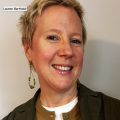
Lauren Barthold, Philosophy FacultyI’ve learned that it is not enough to announce my commitment to dialogue and expect students to know what I mean; I need concrete exercises to allow students to learn how to do it.
Endicott College, Massachusetts

Seth Karamage, MediatorI am amazed at what came out—the way people shared their stories. This is not like a role-play; it really touched me.
Interfaith Mediation Centre, Nigeria

Lauren Cobb, Task Force MemberI now lead teams with a different language, using different processes, and with a different awareness of team dynamics. [I’ve seen] relationships grow and deepen, unity and commitment remain high, and mutual respect established and fostered.
Glendale Presbyterian Church, California

Etionette Nshirmirimana, Burundian Master TrainerI realized that by using the “dialogue” approach, people could talk of what is deep in their heart, especially things that have harmed them.
Burundi

Paul Schupe, Hancock United Church of ChristIt’s amazing how closely we can work together on certain projects and never know what about our faith motivates our work. This work deepened my appreciation for everyone who was there; hearing everyone's stories helped me to appreciate them more and the depth of their convictions, even when they’re convictions I don’t share.
Lexington, Massachusetts

Linda Gryczan, MediatorInstead of demonizing and dehumanizing the other, we built a deeper connection. The fact that we disagree matters much less. It matters much more that we are neighbors in this community.
Montana Mediation Association

Megan DeFranzaHere safe space was created for pastors and church leaders to wrestle with topics like evolution which are all too often “off limits” or believed to be antagonistic to the faith.
Gordon College, Massachusetts

Katie Shear, Civic Engagement CoordinatorUsing what we learned from Essential Partners, staff were able to model effective and respectful communication for students. A next step would be for us to help students employ some of these methods themselves. The staff not only gained skills in communication but also left feeling supported by each other in the work that we do.
Southern Vermont College, VT

Program ParticipantI read this comment from the 14th Dalai Lama: "Every change of mind is first of all a change of heart.” It seems appropriate for what we are doing.
Bayview, Michigan

Megan DeFranzaThere is a need not only for safe space within our churches but for our church leaders who often feel alone, or who may feel their job could be at risk if they engage in controversial conversations. How are they to make safe spaces in their own congregations for healthy dialogue if they rarely experience safe space to do the same?
Gordon College, Massachusetts

Undergraduate StudentAs a pharmacy major, I do not receive much training on how to handle difficult or controversial conversations. I think that this training will help me not only in my duties as a resident assistant, but in discussing medications and therapies with future patients when the conversation becomes difficult.
Northeastern University, MA

Undergraduate StudentEvery opinion was accepted. No one felt judged or uncomfortable talking to one another. These have been, by far, the best classroom discussions I have ever had.
Bridgewater College, Virginia

Teresa Grettano, Associate Professor and Director of the First-Year Writing programFacilitated dialogue creates a classroom atmosphere in which exploring uncomfortable issues and asking difficult questions is an expected part of the process, and it allows students space to engage each other without fear of the vitriol common in our public discourse.
University of Scranton (PA)

Lucinda Garcia, Researcher, Educator & AdvocateThe Dialogic Pedagogy Fellowship at Tufts University, in collaboration with Essential Partners, gave me transformative social-emotional learning and facilitation skills to support meaningful dialogue in the classroom. I’m excited to apply what I’ve learned to design questions that invite personal narratives, value-based discussion, and comfort with complexity—all in service of building a classroom climate where productive dialogue and engaged learning can flourish.

Kim Davidson, OmbudsI’ve gained not only confidence but tools. The Essential Partners training was worth every penny.
Oberlin College, Ohio

Elizabeth Zehl, Undergraduate StudentEssential Partners' process gives people the space to be intellectually curious and to engage with others on important issues in a way that also benefits their own understanding of what they believe.
Randolph College (VA)

Program ParticipantThis is the best adult learning experience I have had in the past five years. I wanted to learn new skills—I did!

Rebekah Shrestha, SVPEssential Partners has played a catalytic role in our ability to facilitate dialogue time and time again, and we could not have done this work without them.
Belfer Center for Innovation & Social Impact and Office of Strategic Planning, 92NY

Jamie Kleinman, Associate Professor“I want every STEM class to have a dialogue. Imagine if the students had more practice doing this in more of their classes. It really speaks to the nature of approaching this from a systems perspective and how big a need there is for that.”
Department of Psychological Science, University of Connecticut

Program ParticipantThis is a new idea, so many people speaking from their hearts. People can come together...if people can understand, they can change their hearts; then this can bring about more change.
Interfaith Mediation Centre, Nigeria

Karen Ramirez, Director of the CU Engage ProgramWe get more requests [for campus dialogue] than we could ever respond to.… I’m proud that our work on campus is actually kind of unusual, because it doesn’t support just one population. It supports everyone—students, staff, faculty, graduate students. I don’t know if there are other University of Colorado projects going on that hit all of our campus population.
University of Colorado, Boulder

Gail AndersonWe became confident really early on that the model was working. We were nervous there would be yelling and blow-ups but after a few conversations we realized that wasn’t happening… People were treating each other humanely.
Minnesota Council of Churches

Bob Bordone, Expert and AuthorEssential Partners does the best work in the field of dialogue and communication.
Harvard Negotiation & Mediation Clinical Program, Co-Founder

Nicki Glasser, Policy CoordinatorWhat surprised me was how much you could transform a relationship during a three-hour conversation.
Transformation Center, Massachusetts

Undergraduate StudentI notice that my classmates take much more care when speaking about people who practice other religions. They make fewer assumptions, and they’re more careful with their words to make sure to avoid unintentional connotations.
Bridgewater College, Virginia

Undergraduate StudentI started to trust everyone in the class—I felt heard and I felt that people wanted to listen. As a result, I wasn’t afraid to let my past come out and let people learn from what I have been through.
Bridgewater College, Virginia

Bob Bordone, Expert and AuthorEssential Partners does the best work in the field of dialogue and communication.
Harvard Negotiation & Mediation Clinical Program, Co-Founder

Patrick Hale, director of Multicultural and Identity ProgramsOne of the things that’s so crucial to even fostering dialogue around diversity, equity, and inclusion is creating opportunities for folks to engage in deep reflective self-awareness.
Babson College, MA

Undergraduate StudentDuring one dialogue, as we were reading The Joy Luck Club, we were asked to discuss our relationship to America. There were students who grew up in the United States and also those who hadn’t—and I was surprised to hear that everyone had equally complex relationships with the topic.
I appreciated being able to hear and express the full depth of our own context before delving into a discussion about first-generation immigrants.
Gordon College, Massachusetts

Program ParticipantI felt an amazing sense of accomplishment when the Essential Partners training ended; that I'd done something important for my community and something important for me.
Massachusetts

Jonathan Noyalas, Director of the McCormick Civil War Institute“RSD has been the most transformative thing in my 21 years of teaching. … Students have a greater desire to open up in class about things because they know that a Noyalas class is a safe environment. ‘I can say things here. I’m not going to be judged. I understand I’m contributing to a broader conversation.’”
Shenandoah University

Program ParticipantI did not anticipate having as many concrete takeaways as I do. I feel there is an immense practical application.

Undergraduate StudentI learned a lot about myself from others’ perspectives—it was comforting to hear similar values and ideas expressed, yet really eye-opening and intriguing to hear very different philosophies.
Dartmouth College, New Hampshire

Undergraduate StudentThe most significant thing for me was learning how to ask for more information rather than trying to persuade a person to think differently. I also learned helpful dialogue tips, which are more effective during difficult conversations. If I encounter a difficult dialogue with any of my residents, I plan on using the techniques I learned in this workshop to facilitate those talks.
Northeastern University, MA

Janet Lansberry, Weissman Center Assistant DirectorThis was probably the most profound workshop that we ever brought to campus. It offered a really unique foundation in personal insight.
Mount Holyoke College, MA

Amy Cottrill, Birmingham-Southern CollegeThe past few years in our country have been the most divisive and alienating in my lifetime, which can be a tremendous challenge in the classroom that aims for community, shared experience, and listening with empathy to opinions that are different from one's own. The Essential Partners workshop I attended provided invaluable tools to meet the challenges of teaching today. It helped me reimagine the classroom as a place to help students learn the essential tools of living and learning in community and interconnection, skills that are necessary in every single area of life. I have no doubt that my teaching has been dramatically reshaped in light of my introduction to structured dialogue and I feel like I have so much more to offer my students because of that.
Birmingham, AL

Megan DeFranzaHere safe space was created for pastors and church leaders to wrestle with topics like evolution which are all too often “off limits” or believed to be antagonistic to the faith.
Gordon College, Massachusetts

Beth MendozaDialogue gets more results. It makes decision-making easier. It makes creating participation easier … our greatest organizational impact has been more contributions as well as more effective and efficient meetings.
Moraine Park Technical College, Wisconsin

James Rucker, Faculty MemberIt is really different than it was before. The Essential Partners process has given me the power to be heard and be seen. It’s unreal.
Randolph College (VA)

Sepi Djavaheri, Community Mobilizers Director“The Essential Partners training has had a multiplier effect—not only did it enrich the Dialogue Across Faiths event itself, but it also equipped a cadre of local leaders with effective tools to lead ongoing, constructive conversations within and between their congregations.”
UJA-Federation of New York
